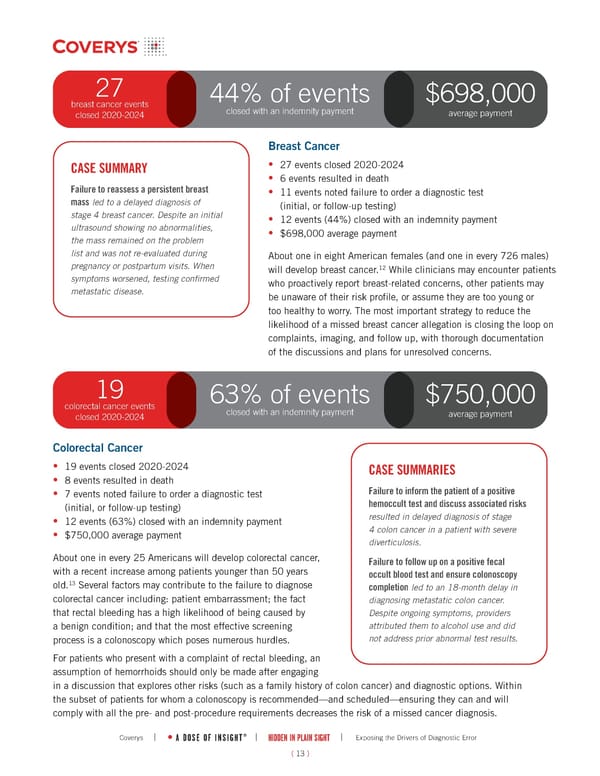( 13 ) | HIDDEN IN PLAIN SIGHT | Exposing the Drivers of Diagnostic Error A DOSE OF INSIGHT ® Coverys | Breast Cancer • 27 events closed 2020-2024 • 6 events resulted in death • 11 events noted failure to order a diagnostic test (initial, or follow-up testing) • 12 events (44%) closed with an indemnity payment • $698,000 average payment About one in eight American females (and one in every 726 males) will develop breast cancer.12 While clinicians may encounter patients who proactively report breast-related concerns, other patients may be unaware of their risk profile, or assume they are too young or too healthy to worry. The most important strategy to reduce the likelihood of a missed breast cancer allegation is closing the loop on complaints, imaging, and follow up, with thorough documentation of the discussions and plans for unresolved concerns. 27 breast cancer events closed 2020-2024 $698,000 average payment 44% of events closed with an indemnity payment CASE SUMMARY Failure to reassess a persistent breast mass led to a delayed diagnosis of stage 4 breast cancer. Despite an initial ultrasound showing no abnormalities, the mass remained on the problem list and was not re-evaluated during pregnancy or postpartum visits. When symptoms worsened, testing confirmed metastatic disease. Colorectal Cancer • 19 events closed 2020-2024 • 8 events resulted in death • 7 events noted failure to order a diagnostic test (initial, or follow-up testing) • 12 events (63%) closed with an indemnity payment • $750,000 average payment About one in every 25 Americans will develop colorectal cancer, with a recent increase among patients younger than 50 years old.13 Several factors may contribute to the failure to diagnose colorectal cancer including: patient embarrassment; the fact that rectal bleeding has a high likelihood of being caused by a benign condition; and that the most effective screening process is a colonoscopy which poses numerous hurdles. For patients who present with a complaint of rectal bleeding, an assumption of hemorrhoids should only be made after engaging in a discussion that explores other risks (such as a family history of colon cancer) and diagnostic options. Within the subset of patients for whom a colonoscopy is recommended—and scheduled—ensuring they can and will comply with all the pre- and post-procedure requirements decreases the risk of a missed cancer diagnosis. CASE SUMMARIES Failure to inform the patient of a positive hemoccult test and discuss associated risks resulted in delayed diagnosis of stage 4 colon cancer in a patient with severe diverticulosis. Failure to follow up on a positive fecal occult blood test and ensure colonoscopy completion led to an 18-month delay in diagnosing metastatic colon cancer. Despite ongoing symptoms, providers attributed them to alcohol use and did not address prior abnormal test results. 19 colorectal cancer events closed 2020-2024 $750,000 average payment 63% of events closed with an indemnity payment
 White Paper - Drivers of Diagnostic Error: Office-Based Practice | Coverys Page 13 Page 15
White Paper - Drivers of Diagnostic Error: Office-Based Practice | Coverys Page 13 Page 15